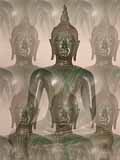To attain Enlightenment one must take birth in human form, and to attain this form, one must have the eighteen qualities which include the Eight Freedoms and Ten Endowments. The Eight Freedoms are one must not be born
1. in the Hell realms
2. as a hungry ghost
3. as an animal
4. in a place where teachings are unavailable
5. as a long-life god (always content and therefore has no motivation for progress)
6. with wrong view (no understanding of karma, and no understanding of past
and future lives)
7. where no Buddha has appeared
8. deaf, dumb, blind or mentally deficient
If one is born in any of the above realms, there is no chance of studying and practicing the teachings. What is therefore necessary are the Ten Endowments which consists of Five Inherent Endowments and Five Karma Provisions. The Five Inherent Endowments are one is born
1. as a human being
2. where there are teachings
3. possessing five senses
4. not having committed heavy negative karmas
5. having confidence in and devotion to the Triple Gem
The Five Karma Provisions are one is born
1. where a Buddha has
appeared
2. where a Buddha has taught
3. where the Dharma teachings flourish
4. where there are followers who enter the pure path of Dharma
5. where there is support from the kindness of others, including the spiritual
master.
In addition, we need The Three Confidences and they are:
1. Faith in the clear mind arises when we see the supreme qualities of the Three Jewels. We develop devotion for and interest in the Buddha as the teacher who shows the path, the Dharma which becomes the path, and the Sangha which guides one in order to accomplish the path.
2. Faith of desire, the wish to be enlightened, to study and practice the Dharma. Seeing what samsara is, we sincerely wish to escape, to reach enlightenment. Recognizing the assets of virtue, we wish to make them our own. Seeing the defects of non-virtue, we wish to avoid them. These wishes inspire the faith of desire.
3. Faith in the truth of karma (causes and effects), trusting that happiness is the fruit of virtuous causes and suffering is the fruit of non-virtuous causes.
One must have all the above qualities together to be freed from samsara.
There are many obstacles to Enlightenment. Our human body is called "precious" because with this vehicle one can avoid all non-virtue and achieve virtue, cross the ocean of samsara, and complete the path of Enlightenment ending in full Buddhahood. Therefore, the human form is superior to any others, including those of gods and nagas. As this advantage is difficult to obtain, we must have ethics and morality and practice the ten virtuous actions. We must not waste the wonderful opportunity we have to practice, as it is extremely rare. In fact, the Buddha gave the following analogy to demonstrate the rarity of this opportunity: a blind tortoise was swimming in an ocean in which there was a yoke with a hole in it. This yoke was tossed about in every direction by the waves, while the tortoise only came to the surface of the water once every hundred years. There is as much chance of being born in a human body as there is that the blind turtle's neck will meet up with the hole of the yoke! if one has this opportunity, one is very fortunate. Therefore, one should rejoice and use this opportunity to the full, both for oneself and others. In fact, one should use human life to cross the ocean of samsara as one uses a ship to cross the sea.
To achieve Enlightenment, we need devotion and confidence in Buddhahood. Without these, it is difficult to attain to a spiritual quality in the mind. Just as a rotten seed cannot produce a healthy plant, so faltering devotion cannot produce virtue. Devotion and confidence mean an understanding of cause and effect. A positive cause creates peace and happiness, and a negative cause leads to suffering. Afflicting emotions cause different levels of suffering to arise, whereas Enlightenment is sacred and precious, free from confusion and pain. To achieve this state, one must have devotion and confidence in the Buddha as the teacher who shows the path, the Dharma as the path itself, and in the Sangha as the community which cultivates the Enlightenment mind and acts as a guide to Buddhahood. Devotion and confidence are like water to a seedling; if one is endowed with these qualities, one can meet many great masters and receive the precious teachings. So when the precious human body containing the Eight Freedoms and Ten Endowments and in addition possesses devotion and confidence, the being has the basis for achieving Enlightenment.
It is asked why, if we are born as humans many times before, and have met spiritual masters, we did not previously achieve Enlightenment. The reason is that we fell into conditions of error such as attachment to this life, attachment to samsaric pleasures and laziness, attachment to our own liberation, and not understanding the method for achieving Buddhahood. To dispel such errors, there are four antidotes: the contemplation of impermanence, understanding the suffering in samsara and the truth of karma and result, the practice of loving kindness and compassion, and the cultivation of the Enlightenment mind.
Obtaining a life of
leisure and endowments is like arriving at a continent of jewels.
Whether we attain liberation or not is up to us.
Be sure, therefore, not to leave empty-handed.
This is my heart's advice.
(from Jewel Treasury of Advice)
